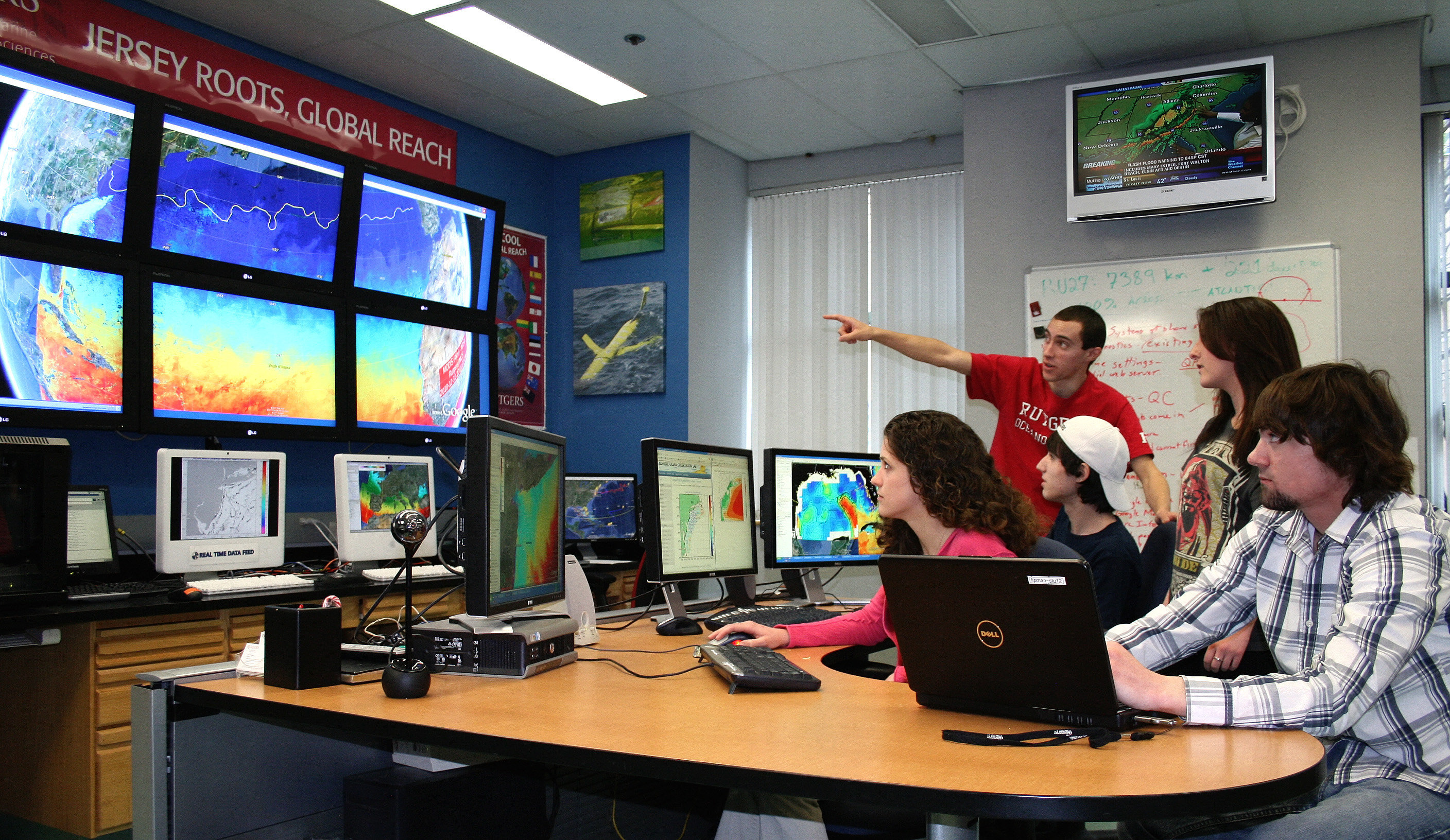Consortium for Ocean Leadership Names Rutgers to OOI Team

(Click to enlarge) Students participating in Rutgers University’s Coastal Ocean Observatory Laboratory classroom (COOL Classroom) program conduct studies on the ocean over time. Rutgers, as the OOI Implementing Organization for Education and Public Engagement, will build a variety of software interfaces and web-based tools that ultimately will allow educators and outreach specialists to bring OOI data and transformative science into their learning environments. (Photo provided by Rutgers, The State University of New Jersey.)
The Consortium for Ocean Leadership Names Rutgers University to Ocean Observatories Initiative (OOI) Team
(Washington, D.C.) – The Consortium for Ocean Leadership announced Rutgers, The State University of New Jersey, will join the Ocean Observatories Initiative (OOI) to build a variety of software interfaces and web-based tools that ultimately will allow educators to bring the ocean into their learning environments.
As the Education and Public Engagement (EPE) Implementing Organization (IO), Rutgers will lead the development of educational capabilities for the OOI and leverage the system’s cyberinfrastructure capabilities by constructing a series of software and web-based social networking tools to engage a wide range of users including faculty, graduate and undergraduate students, informal science educators and the general public. The software will be designed to provide science educators with a suite of tools allowing them to enhance their graduate and undergraduate education activities and engage the general public using ocean observation data from the OOI.
The OOI, a project funded by the National Science Foundation, is planned as a networked infrastructure of science-driven sensor systems to measure the physical, chemical, geological and biological variables in the ocean and seafloor. As a fully integrated system, OOI will collect and disseminate data on coastal, regional and global scales. Through a unique cyberinfrastructure, OOI will make ocean observing data available to anyone with an internet connection. Greater knowledge of the ocean’s interrelated systems is vital for increased understanding of their effects of biodiversity, climate change, ocean and coastal ecosystems, environmental health and climate.
“The Education and Public Engagement IO is a vital element of our OOI Team and will create the innovative software applications and tools necessary for those developing educational products to provide students, educators and the public with compelling ocean educational experiences,” said Tim Cowles, Vice President & Director of Ocean Observing at the Consortium for Ocean Leadership. “The leading edge tools the Rutgers team develops will enhance the size, scope and diversity of the ocean education user community and increase our ability to promote a culture of open access to OOI assets as well as facilitate the exchange of creative ideas for its growth.”
The University of Maine and Raytheon Mission Operations and Services, based in Pasadena, Calif., are additional members of the Rutgers EPE team. The University of Maine will lead the user requirements process and contribute its previously designed concept mapping tool as the underlying infrastructure for the content interface between the OOI cyberinfrastructure and developers’ tools. Raytheon will provide middleware and tools development.
“Our team is honored to be selected to build the education and outreach infrastructure for NSF’s Ocean Observing Initiative,” said Scott Glenn, Rutgers Principal Investigator for the EPE Implementing Organization. “Our goal is to further enable the ocean community to use the OOI to inspire the next generation of scientists, engineers, educators and explorers. Together, we will broaden the definition of what it is to be an oceanographer, and continue to prepare society to face the global challenges of the 21st century.”
The OOI Program is managed and coordinated by the OOI Project Office at the Consortium for Ocean Leadership in Washington, D.C., and is responsible for construction and initial operations of the OOI network. Rutgers, with its partners the University of Maine and Raytheon, joins three implementing organizations responsible for construction and development of the overall OOI program. Woods Hole Oceanographic Institution and its partners, Oregon State University and Scripps Institution of Oceanography are responsible for the coastal and global moorings and their autonomous vehicles. The University of Washington is responsible for cabled seafloor systems and moorings. The University of California, San Diego is implementing the cyberinfrastructure component.
The OOI five-year construction phase began in September 2010, with nearly $106 million of first-year funds coming from the American Recovery and Reinvestment Act of 2009, and $5.91 million in NSF construction funds. Requests in FY 2010 and beyond, totaling $274.58 million for construction, fund the acquisition of OOI instruments and sensors, production of key infrastructure elements such as the coastal and open ocean moorings and the deployment of these assets.
The first year of funding under the Cooperative Agreement supports a wide range of construction efforts, including production engineering and prototyping of key coastal and open-ocean components such as moorings, buoys, sensors, award of the primary seafloor cable contract, completion of a shore station for power and data and software development for sensor interfaces to the network. Subsequent years of funding will support the completion of coastal, deep-ocean, and seafloor systems, with initial data flow scheduled for early 2013 and final commissioning of the full system in 2015.
About the Consortium for Ocean Leadership
The Consortium for Ocean Leadership is a Washington, DC-based nonprofit organization that represents 95 of the leading public and private ocean research and education institutions, aquaria and industry with the mission to advance research, education and sound ocean policy. The organization also manages ocean research and education programs in areas of scientific ocean drilling, ocean observing, ocean exploration, and ocean partnerships.
For more information or interviews, contact:
Kerry G. Beck
Director of Communications, OOI
Consortium for Ocean Leadership
Office: (202) 787-1685
Cell: (202) 538-0099
kbeck@oceanleadership.org
